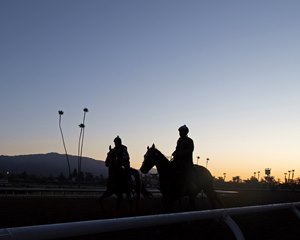TOC Discusses Training Expenses With California Owners


Although an April 10 teleconference organized by the Thoroughbred Owners of California focused mainly on a resumption of racing at Santa Anita Park and Golden Gate Fields amid COVID-19, the ongoing expenses for horse owners and trainers were also addressed.
During a Q&A period with owners, TOC president and CEO Greg Avioli said a resolution could come as early as April 13 to solve a shortfall in the self-insured workers' compensation insurance program for California trainers. That program, run by the Post Time Self Insurance Group, notified trainers last week of a $1,233 per horse fee during a dramatic state reduction in racing.
"We have basically identified funds that we believe are 95% there that by early next week, we will be in a position to fund the shortfall for Post Time from other industry resources without requiring those funds being paid right now by the trainers," he said. "I think that's going to be a big relief for a lot of trainers.
"And as owners, we know that in many instances, costs for workers comp and other things from trainers ultimately get passed on to owners. So part of the efforts of the TOC in this regard was also to make sure the owners were not required to handle additional financial burdens at this time."
Avioli did not state the funding mechanism but praised collaborative efforts of racetracks and horsemen organizations to sustain the California horse population. He said 2,226 horses are in active training in Southern California, spread between Santa Anita, Los Alamitos Race Course, and San Luis Rey Training Center, plus roughly 1,300 in Northern California.
He emphasized that at least 2,000 are needed in Southern California for racing at Santa Anita, which was shuttered by the Los Angeles County Health Department on March 27 when deemed a nonessential business during COVID-19. Golden Gate was closed April 2 by Alameda County officials. Both tracks had been racing without spectators as a public health precaution.
Training continues to be permitted. Santa Anita and Golden Gate are seeking approval to resume racing.
Only Los Alamitos in Cypress is conducting racing in the state, running Quarter Horses and lower-level Thoroughbreds during evening programs. It is permitted to do so by its local regulatory authority, the Orange County Health Department.
Without revenue from purses, owners and trainers are feeling an economic pinch, a topic raised by callers to TOC leaders and track executives from Santa Anita Park and Del Mar who participated in the teleconference.
Avioli estimated that training costs for the state's 3,500 active Thoroughbreds reached $10 million a month, based on a $100-per-day training rate. Currently, there is no revenue to offset those costs aside from money earned at Los Alamitos, where purses are small for Thoroughbreds during its mixed meet—between $6,000 and $18,000 per race this month, depending on the class level.
TOC board members and horse owners Gary Fenton and Nick Alexander offered different views regarding the costs of sustained training.
Fenton, the managing partner of Little Red Feather Racing, which has 85 horses in training and more than 300 partners, said he has reached agreements with his California trainers for reduced day rates. He broached that subject after seeing an email from another trainer who had done so, calling it a "win-win" by keeping horses on track instead of removing them from training to be idle at farms, where costs are lower but fitness is lost.
Alexander, also a breeder and the TOC's chair, considers a reduction of training fees to be a personal decision.
"I've been with both my trainers for dozens of years, and if it does come to a discount at some point, they'll offer it. I won't ask for it," he said. "I am not suggesting that's the way for anybody else to do it. I think you have to decide on your own. Some of you are already getting a really good deal with what you're paying now, and some of you are struggling to pay what seems like too much. I don't think the TOC needs to take a position (of) one way fits all. It's up to you and your trainer."
Trainers, many of whom are seeking to keep their staff employed, have their own financial worries. Even before the COVID-19 crisis, some received delayed payments from owners or no payments at all, conditions that could worsen in a troubled economy.
Asked whether California might adopt a subsidy for horsemen like a newly implemented one in Ontario, Canada, where participants can access certain purse funds, Avioli said it is on the table.
"We had been talking in broad terms about what might be available," he said. "In Southern California, the primary driver you would see for that would be the purse accounts. And the question there would be, is there money available there in the purse accounts that you could essentially loan or pledge to owners during this period of time? Our purse accounts are actually in remarkably good shape in Southern California right now."
Also taking a financial hit are the state's tracks, which have fixed costs and expenses associated with training. Santa Anita, which, like Golden Gate, is owned by The Stronach Group, is operating at a loss of a half-million dollars a week during its closure, Avioli said.
"We have to do whatever we can do to keep these horses in training, but there is no easy answer," said Craig Fravel, the CEO of racing operations for TSG. "Unfortunately, there is no playbook on any of this. We are all addressing things really day by day, unfortunately, and hopefully we never have to deal with this again. We're learning every day and trying to keep our minds open to suggestions."

